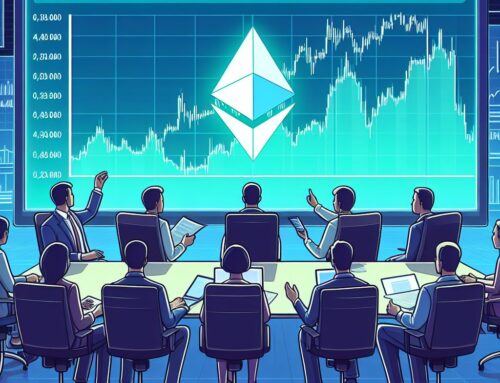Deciphering the Web3 investment Blueprint: An interview with Yat Siu, Co-founder of Animoca brands
Behind every pioneering leap into the digital frontier lies a meticulous strategy. Today we dive into mega investor Animoca Brands' foray into the world of Web3 and the metaverse, straight from its visionary co-founder Yat Siu. Yat talks to us about the alignment of Web3 and AI, crypto building in Asia, and the crypto market downturn.
Introduction:
In the ever-evolving digital realm, where virtual and reality blur and our very understanding of ownership and interaction changes, Animoca Brands stands — as a behemoth shaping the future. They are one of the world’s leading investors into Web3, play-to-earn gaming, non-fungible tokens, and the metaverse. Today in an exclusive conversation for Hong Kong Fintechweek, Brave New Coin speaks to Yat Siu the Co-founder, executive chairman, and managing director of Animoca Brands
We unravel the strategy, philosophy, and foresight that positions the company at the vanguard of the digital revolution. We also chat about the new crypto regulatory framework in Hong Kong and the crypto investment oppurtunities in Asia.
This interview is part of a series of articles will be conducting with speakers at Hong Kong Fintech Week.
Hong Kong FinTech Week 2023 (HKFW) is here. The eighth edition of HKFW, themed "Fintech Redefine." will take place from October 30 to November 5. This flagship event lies at the core of global fintech innovations and aims to shape the future of fintech across various dimensions of financial services and beyond.
The Interview
1. What do you think challenges are the biggest barriers blocking the adoption of Web3 and what can the industry do to address them?
Education and awareness are crucial. A significant segment of the population remains unsure or misinformed about what Web3 or the metaverse represents: the shift from platform/publisher ownership to user ownership in the digital world. This misunderstanding is driven by a number of bad actors who have associated blockchain, cryptocurrency, and Web3 with scams. We must continue to build, demonstrate, and educate the world about the true potential and advantages of blockchain and in particular its enabling of true digital ownership.
The current state of user interface and user experience in many dApps often present challenges to those not yet familiar with Web3. As blockchain technology evolves to a point where users can seamlessly interact with it, even unknowingly, we’ll see notable increases in adoption.
The need for improved regulatory clarity is also crucial. A clearer regulatory framework will restore the confidence that waned during the various crises of 2022. In this aspect, Asia is setting a good example with policies being established in regions like Hong Kong and Japan, which are already facilitating adoption.
2. What are the critical factors that will determine the success of play-to-earn gaming in the mainstream market?
Play-to-earn is just one example of what is possible once you have the ability to have full and true ownership. That’s also why it’s now typically referred to as play-and-earn; earning is something you have the option to do but is not the sole reason to play a game. In terms of value, whatever you earn in a game need not simply be financial in nature, but could also be reputational, social, and/or cultural.
One of the additional crucial factors is the successful onboarding of mainstream gamers. We’re on the cusp of seeing more AAA Web3 games hitting the market, such as Phantom Galaxies from our subsidiary Blowfish Studios and Wreck League from nWay. These high-quality games will help traditional gamers understand that Web3 games can match the quality of games they’re accustomed to. This recognition of quality and familiarity will encourage more traditional gamers to engage with Web3 gaming. By interacting with these games and truly owning virtual goods, they’ll be directly exposed to the benefits and potential of digital ownership, such as economic freedom over the goods they own.
3. Could you explain your vision for the open metaverse? How do you see it affecting our everyday lives?
We are firm believers that the open metaverse is the future. It can be described as the Internet of Ownership which means the foundation is based on true digital property rights. The notion that the metaverse is purely a VR or AR environment, particularly one built on outdated models of proprietary "walled gardens," is a big misconception.
For us, the metaverse isn’t about VR goggles, specific virtual worlds, or games. It’s about an open, decentralized network of systems and environments connected by genuine digital ownership, interoperability, and community governance, as envisioned by most developers in the Web3 industry.
The open Metaverse is constructed on a "meta" plane of digital ownership and that’s why it is such an interesting and powerful concept. Property rights are the essential foundation of all economies based on capitalism – property rights and capitalism are inextricably linked. The freedom that capitalist economies enjoy is directly related to their strong property rights (ownership of something also confers economic freedom over that something). These rights and freedoms serve as the foundation of the most successful and prosperous nation-states. The digital equivalents of these concepts enable all the experiential layers of the open metaverse, which include not just the oft-cited VR but also any other digital interface.
This fundamental shift towards digital ownership is currently underway in the Web3 world and will only gain momentum, similar to the rapid growth of the Web in the late 1990s or the mobile Internet around the 2010s. The ongoing evolution of the Internet is now being fueled by blockchain technology.
For more on this concept, I suggest viewing my recently published TED talk on digital ownership: https://www.ted.com/talks/yat_siu_the_dream_of_digital_ownership_powered_by_the_metaverse
4. How do you see the intersection of gaming, blockchain, and the metaverse developing in the next 5-10 years?
For several decades, gaming has profoundly influenced the physical world by driving advancements in numerous underlying technologies. These advancements have not only enhanced the quality of games but have also contributed powerfully to the evolution of industrial infrastructure. Consider how gaming has spurred the progress of GPUs, display technologies, control devices, connectivity, processing power, storage, and even gaming furniture. Smartphones became viable revenue generators and induced their initial mass adoption as they evolved into sophisticated gaming devices. The intertwining of content, culture, and technology is a crucial aspect of this progression.
The transition from Web2 to Web3 necessitates not just the blockchain infrastructure but also cultural factors, which could be social, entertainment, or consumption-oriented, but that are all driven by gaming to induce mass adoption of this infrastructure. Take the Internet as an example: while connecting to the Internet links us to a remarkable infrastructure, its primary attraction for people is not the impressive technological achievement of the Internet but the access that it provides to content and services.
The open metaverse – a virtual society with real economic impact, empowered by digital ownership – represents the next logical evolution of our digital lives in the next 5-10 years. The open metaverse is a realm where our time provides value and meaning to us, rather than just to the publishers and platforms that exploit our data and attention in the current Web2 paradigm.
5. Could you provide some insights into the principal criteria and overarching philosophy that guide Animoca brands in its selection of investment opportunities?
Our investment strategy and process are deeply rooted in our conviction that Web3, blockchain, and NFTs hold the potential to revolutionize our interaction with the digital world by enabling ownership. We’ve adopted a holistic approach to fostering the entire blockchain ecosystem and, to date, we’ve invested in over 400 Web3-related companies and projects using our own balance sheet and also operate many subsidiaries such as The Sandbox, TinyTap, Darewise Entertainment, Blowfish Studios, and many others.
We are particularly drawn to companies and projects that emphasize openness and interoperability, possess the potential to drive mass adoption of Web3, and significantly contribute to the development of the open metaverse – for example anything that increases the network effects related to ownership of NFTs. This includes projects constructing open metaverse worlds as well as those enabling the provision of true digital property rights based on open and interoperable assets. This includes platforms and protocols, marketplaces, and consumer products such as games and virtual worlds.
6. How do you think this regulatory shift, the new SFC licensing regime, will affect retail investors’ approach and sentiment toward digital assets in Hong Kong?
The new SFC licensing regime will add an extra layer of legitimacy and security to digital assets in Hong Kong. It will help clarify the rules of engagement, making the digital assets market more transparent and less risky for retail investors.
While regulation might initially be seen by some as a hurdle due to the stricter compliance requirements, in the long run it will boost investor and consumer confidence. Retail investors will feel more secure knowing that the platforms they’re using are regulated and that there are protections in place.
This could ultimately lead to greater participation from retail investors, as well as attracting more institutional investors – both of which will contribute to the overall growth and maturity of the digital assets market in Hong Kong.
7. Has the JPEX fraud saga affected perspectives on Hong Kong’s new, more open digital asset policy?
The JPEX incident emphasized the need for clear and robust regulation to protect retail investors. It’s crucial to acknowledge that with most innovations, including during the early days of the Web, there are always inherent risks and potential for misuse. We believe that the Hong Kong government will continue collaborating with involved parties to develop rules and standards that can deter malicious actors without suppressing innovation. With its heritage as one of the world’s main financial centres, Hong Kong has immense potential to emerge as a global innovation hub and a leader in the digital asset economy.
We, together with other Web3 industry leaders in Hong Kong, released a statement in response to the JPEX incident: https://www.animocabrands.com/statement-by-hong-kong-web3-industry-leaders-in-response-to-jpex-incident
8. Brave New Coin is New Zealand-based and a large chunk of readership is US-based. I am curious as to your thoughts on what the West misses about crypto in Asia, and what should we be focusing on within the Asian crypto market.
A key aspect that is often overlooked is how quickly the Asian crypto market has grown and how open it is to innovation. There is a strong entrepreneurial spirit here, paired with a high degree of tech literacy, providing an ideal breeding ground for advancements in blockchain and crypto.
Moreover, Asia, particularly places like Hong Kong and Japan, are establishing clear regulatory frameworks for digital assets. This is crucial as it fosters an environment where innovation can thrive alongside investor protection. In Asia, we’re seeing a shift towards a more decentralized internet, where digital ownership and user autonomy are prioritized. This is a region where we expect to see even more impressive growth and innovation in the coming years.
9. We are in the midst of what I would describe as a ‘mild’ bear market but certainly, interest in Web3, NFTs, and the metaverse has waned and been overshadowed by technology like AI. How are investors, startups, and users alike handling current market conditions?
Web3 is still in its early stages and has yet to realize its full potential. AI and Web3 are not mutually exclusive; they’ll likely evolve symbiotically. If we envisage a future where AI entities transact autonomously, it’s logical to assume that these transactions would occur in cryptocurrency. Projections suggest that 70-80% of transactions will be conducted through autonomous AI agents in the future, and the decentralized nature of crypto makes it a fitting choice for this.
If we all share the reasonable belief that Web3 will revolutionize the world (much as its predecessor Web2 did), then the current market conditions should not be seen as a deterrent. Our focus should remain on advancing the technology, educating the public, and creating transformative dApps for the greater good. In time, we will all reap the benefits of true digital property rights and a more equitable digital economy, regardless of market fluctuations.
Also, given all the excitement around the imminent launch of various Bitcoin Spot ETF and the recent inflows in Web3 projects I would argue that, while overall activity by volume might be lower than the peaks of 2021, it’s still reasonably positive (e.g., our projects Mocaverse and Darewise Entertainment both recently raised capital, see links).

Don’t miss out – Find out more today



